Back in January of 2023, I came into W&M as a timid, yet ambitious spring first-year transfer looking for any and all opportunities right out of the gate. When I saw that Student Transition Engagement Programs was hiring a new digital marketing intern, I took the chance with my first ever interview and was offered the job that would become such a stepping stone to my academic, personal, and professional life. Over the past three years I have written countless blog posts (especially those on cafes and study tips), designed many “welcome to William & Mary!” posts, and more recently been introduced to the vlog on youtube! Working for STEP has been such a highlight during my time here and I’m so incredibly grateful to have been a part of the amazing work they do. From welcome events, orientation, convocation, on-campus events, and more, STEP has helped countless prospective, incoming, and current students from beginning to end. And whilst my end to undergrad has come as I graduate this January, I look back and am so grateful that STEP took a chance on me back in March of 2023. Here’s a big thank you to everyone at STEP, especially my absolute star of a boss and mentor, Lauren Garett, for all the things she has done for me and everyone! It’s bittersweet to think how fast the time has passed and that I no longer will write these blogs. But I will always be grateful for all the opportunities STEP has provided me during my three short years here at William & Mary! Wherever this next chapter takes me, I know I’ll always have this past STEP to look back on!
Author Archives: dosori
How I Lived the Hannah Montana Lifestyle While at W&M
I simply cannot believe that I’m nearing my last week of undergrad! It’s gone by so incredibly fast, but I wouldn’t change it for the world. I came into university not wanting to sacrifice any of my (very different) interests, and I’m happy to report that I very much did not. In fact, I’ve balanced studying biology & business with dancing in a professional show, gaining undergraduate research experience, exploring jobs in digital marketing, and expanding my own company. While it definitely wasn’t easy, I got to live the best of all worlds for my 3 years here. Starting in my first semester, I would train for the world championships of Irish Dance from 8-10, go to class from 11-2, then go off to rehearsals for Busch Garden’s Celtic Fyre. Each spring was spent in the busy cycle of morning classes and evening performances. During my next semester I had the opportunity to expand my knowledge and skills in marketing and research. I joined the STEP team writing this very blog and making posts for students like you! I also had the opportunity to join Professor John Swaddle’s lab, working as an assistant to a grad student examining the effects of polarized light on zebra finches. This would later lead to an independent research project on the effects of lead on birdsong! During all years I witnessed the rollercoaster that has been megmstudy. Megmstudy is my own little brand that started as an instagram page during the pandemic, sharing tips and tricks about learning from home. Since then it’s surpassed 107,000 followers, 10 million monthly views, and certainly my imagination. I’ve hired an employee (does it count if she’s my sister?) and expanded to practically all social media platforms. While managing this company started purely from my own intuition, I’ve learned more about how to conduct professional businesses from my time abroad in the Global Business Minor Program. Along with my time working for STEP, I’ve gained hands-on knowledge on better digital and social media marketing practices that I couldn’t have gained on my own. I will forever be grateful for all of the experiences I’ve been blessed to have at this school. William & Mary truly is the perfect place to try it all.
Why Williamsburg Needs a Good Matcha Spot
Anyone who knows me knows that I will do anything for a good cup of matcha. During my time abroad, I came across Blank Street in London who have the absolute best matcha I’ve ever tried. Unfortunately for me and other Blank Street lovers, the closest store to here is in Georgetown. In a search for finding the best matcha in Williamsburg, I’ve tried the matchas at the cafes on campus and surrounding areas, but nothing comes close to the level of matcha that big cities have (though, Hohl came pretty close). Matcha is becoming increasingly popular amongst college-age individuals as a great alternative to coffee or regular tea. However, Its quality can be variable on a variety of factors during production making it a more popular homemade rather than mass produced drink. This makes finding a good quality matcha extremely difficult. As someone who doesn’t drink coffee and rather opts for a chai or matcha latte, there is a lack of non-coffee options at local cafes, and consequently a perfect opening for a matcha-centered cafe in this city. Williamsburg holds the quaintest campus and is extraordinarily loving of cafes which makes me believe that the addition of a new matcha spot would do extremely well here. Under constant development, there is always a new retail spot for a new cafe to come in (either on campus or nearby). Having this new matcha-centered cafe would be a great victory for those looking for coffee alternatives. It doesn’t necessarily have to be Blank Street, but Williamsburg is the perfect place for a new matcha spot.
My Favorite Finals Tips as a Senior
Finals season has always felt strange to me as someone with an extremely busy schedule. All of a sudden you find yourself with so much empty time to be filled with studying (presumably). But sometimes for me, having this much time leads to procrastination or confusion on how to spend it.
Here are the top things I’m implementing into my final finals season that I’ve learned during my time here.
- Stick to your usual schedule
It might seem like a good idea to spend the extra time doing things you wouldn’t normally have time for during the semester, but deviating from your usual schedule can actually be super unhelpful. For example, staying up later or getting up earlier messes with your circadian rhythm.
- Plan out your tasks
I have a list of everything I need to do: assignments, projects, essays, etc. in order of due date and difficulty! This helps me plan out what I need to be doing and when so that I stay on top of my work.
- Dedicate time for yourself
While studying for 12 hours each day might help you memorize more, it’s also equally as important to take breaks! Having time to indulge in hobbies, hang out with friends, and exercise can help reset from studying and regulate your mental health.
- Get enough sleep, hydration, and fuel
Make sure you’re using some of those breaks to refuel yourself! Studying without energy won’t help you remember anything, so make sure to take care of yourself first!
- Have something to look forward to each day
I know that this tip has helped me time and time again. I love scheduling dinners with friends, getting a sweet treat after a long day of studying, doing something to get me into the holiday spirit, or honestly some retail therapy never hurts. Reward yourself for the hard work you’re putting in!
- Trust yourself when it comes to exam time
A common thread amongst W&M students is perfectionism, but it’s so important that you trust the work you’ve put in not only during finals, but the entire semester! You’ve done the work and now trust yourself to convey that when it comes to your final exam.
An Updated Audit of Williamsburg Cafes
This was one of the first blog posts I’ve written, and since then there’s been so many new cafes opening up! Here’s a list of the majority of cafes and coffee shops in Williamsburg starting with the closest to campus!
Town Center Cold Pressed – an on-campus cafe located in Sadler serving anything from coffee to cake pops!
Column 15 – Located in Swem and serving up a fun drink of the week! There’s also a full service cafe a short drive from campus
Starbucks – Possibly the busiest Starbucks in Virginia, right across from campus!
Culture Cafe – Across the road from Chick-Fil-A, Culture Cafe is a perfect place to study and get a pastry!
Bakeshop – Use your dining dollars for pastries, bagels, pizza, and drinks
Eleva – Right off Jamestown road right by Merchant Square, find a selection of drinks, pastries, and baklava!
Illy – Located across from Wren in Merchant Square, Illy is a perfect spot to study and grab coffee!
Aromas – Aromas is a staple of Williamsburg with so many options for both food and drink from 7am to 8pm!
Kiln Kingdom – Kiln Kingdom is super unique in that it’s a store and cafe in one! Grab a coffee while shopping for a new mosaic lamp!
Hohl Cafe – My personal fav! Hohl is located in a house and serves the most delicious food, pastries and drinks!
Secret Garden – A bit further into Colonial Williamsburg, Secret Garden has bubble tea, ice cream, and more!
Grit Coffee – Perfect for those living in Midtown! Also for seniors (mug deal!!)
Whale Tea – Also within Midtown, Whale Tea sells boba tea and ramen!
Anon. Cafe – Moving to New Town, Anon. Cafe is a new coffee shop with a variety of drinks!
Kung Fu Tea – If you couldn’t tell, I love boba tea, and Kung Fu Tea is the best out there!
Another Broken Egg Cafe – If you have the chance to venture down Richmond Road, check out Another Broken Egg Cafe for brunch and pancakes!
Tipsy Beans – Farther down Richmond Road is Tipsy Beans! They have the best brunch food and specialty coffees!
Carrot Tree Kitchens – On the other side of campus down Jamestown Road is Carrot Tree Kitchen, a perfect little bakery!
1607 Cafe – Right next to Carrot Tree Kitchens is 1607 Cafe Company! Stop by for a specialty coffee or breakfast sandwich.
Into The (West) Woods: Exploring the Brand New Dorms!
This past Friday I had the privilege to explore the brand new dorms with Danny for the first ever vlog x blog crossover! To say I was completely stunned by how gorgeous these new dorms are would be an understatement. Having started my W&M journey in the botetourt complex, It’s so strange to see how much that side of campus has changed!
First up we have Oak. This hall is directly off of the sky bridge connecting West Woods to Sadler and right across from the dining hall opening soon! Oak features a grand hall fit for studying, people watching, or just hanging out. It also has two large conference type rooms on the main floor. Oak hall has 150 upperclassmen residents with a communal lounge, study room, and single-use hall bathrooms on each floor. All of the West Woods Halls are air conditioned, have laundry within the building, and are central to campus!

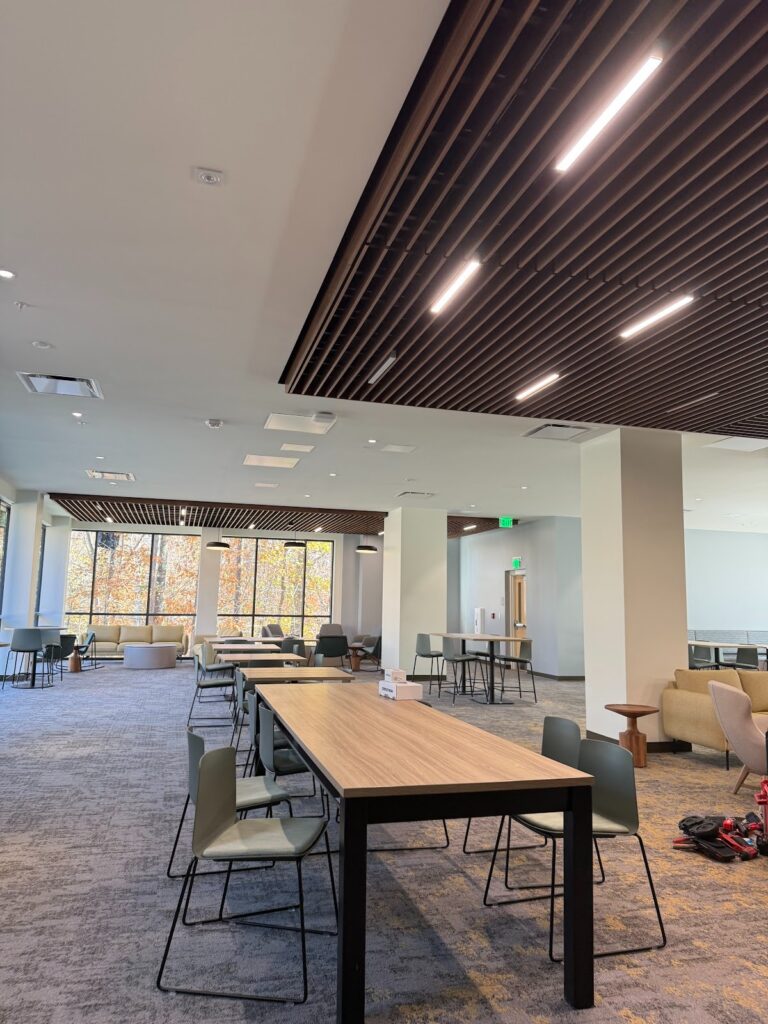
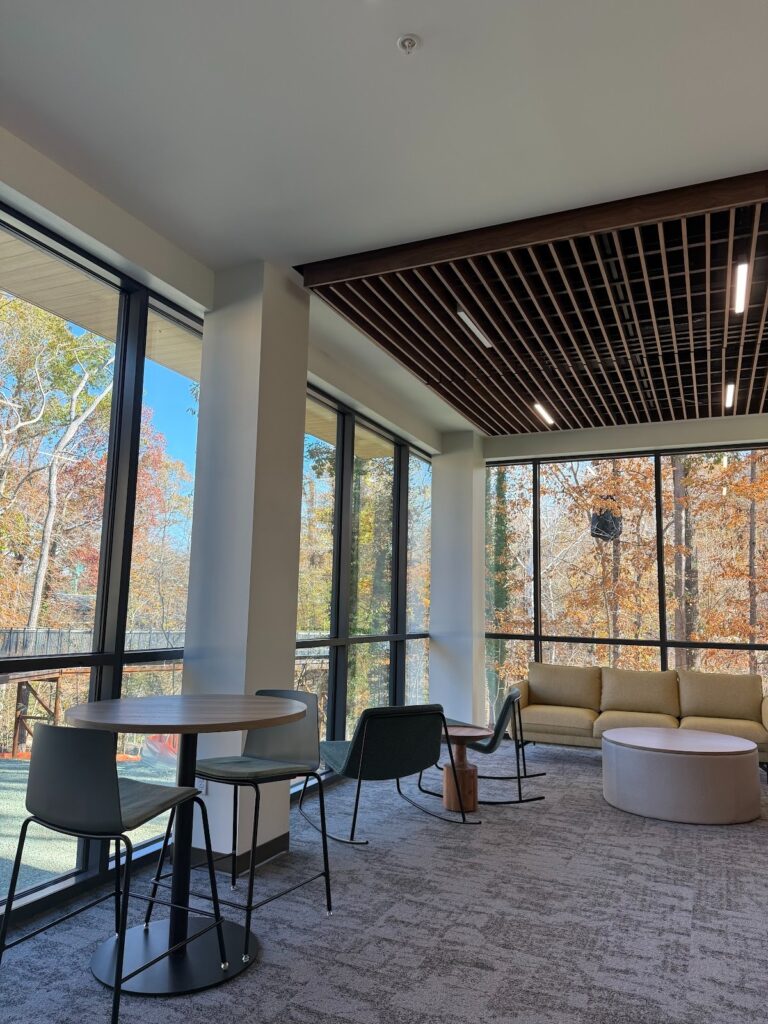
Next up is Pine! Pine is the largest hall in West Woods housing 500 freshman and upperclassmen residents. First-year students occupy the first two levels while upperclassmen occupy the third and fourth levels. Pine’s fourth floor is also home to the Global Village; a living-learning community for language houses! Like Oak, Pine also has lounges and study rooms on each floor. There are many special amenities to Pine including the two outdoor terraces and being directly connected to the brand new dining hall (opening soon)!

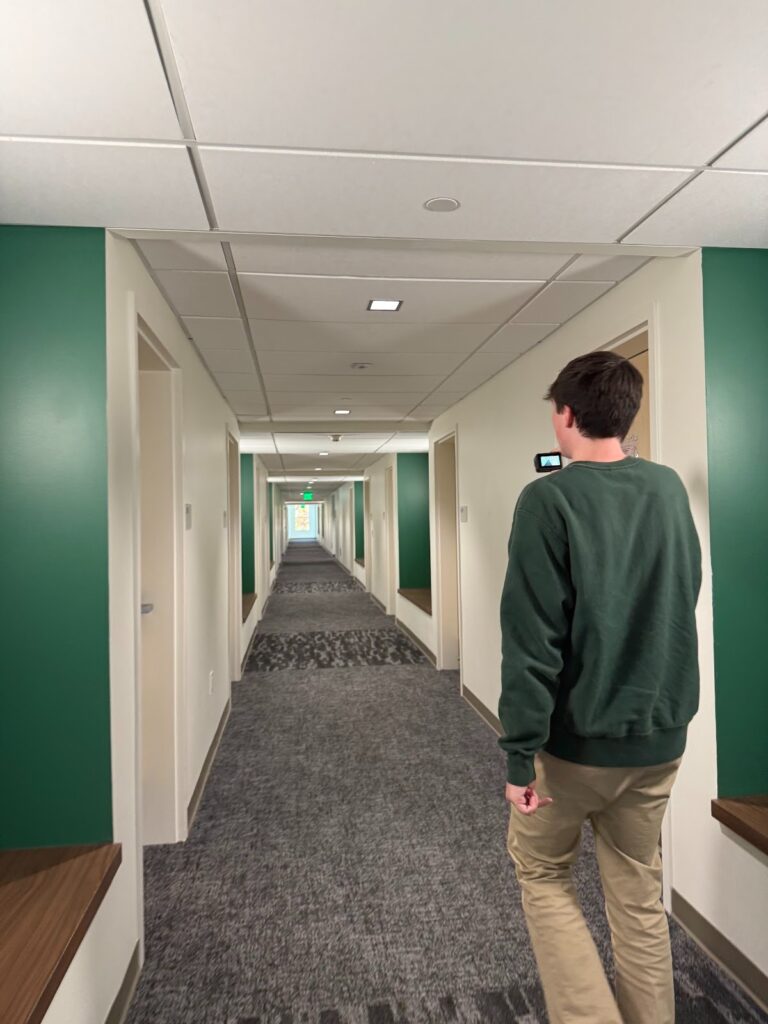
Next up we have both Poplar and Maple. Poplar houses 120 residents in both single and double rooms. Maple houses 150 residents and is home to the Lavender house; a special-interest, co-curricular, co-residential community for students who identify as LGBTQ+ or are allies of the community. Like all other West Woods halls, Poplar and Maple have study rooms and communal lounges on each floor!
Next we have Cedar Hall! Cedar completes the Jamestown Triangle along with Lemon and Hardy! It’s aesthetic is very similar to that of West Woods with communal lounges, study rooms, and the cutest little booths! There’s even skylights in the fourth floor lounge!
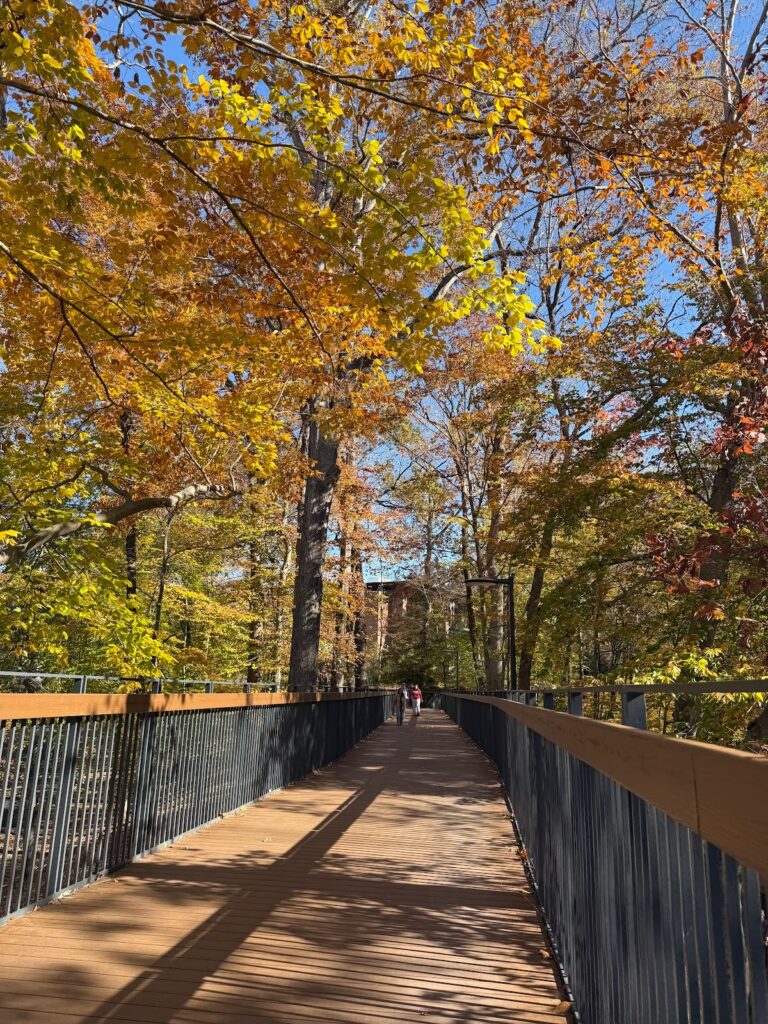
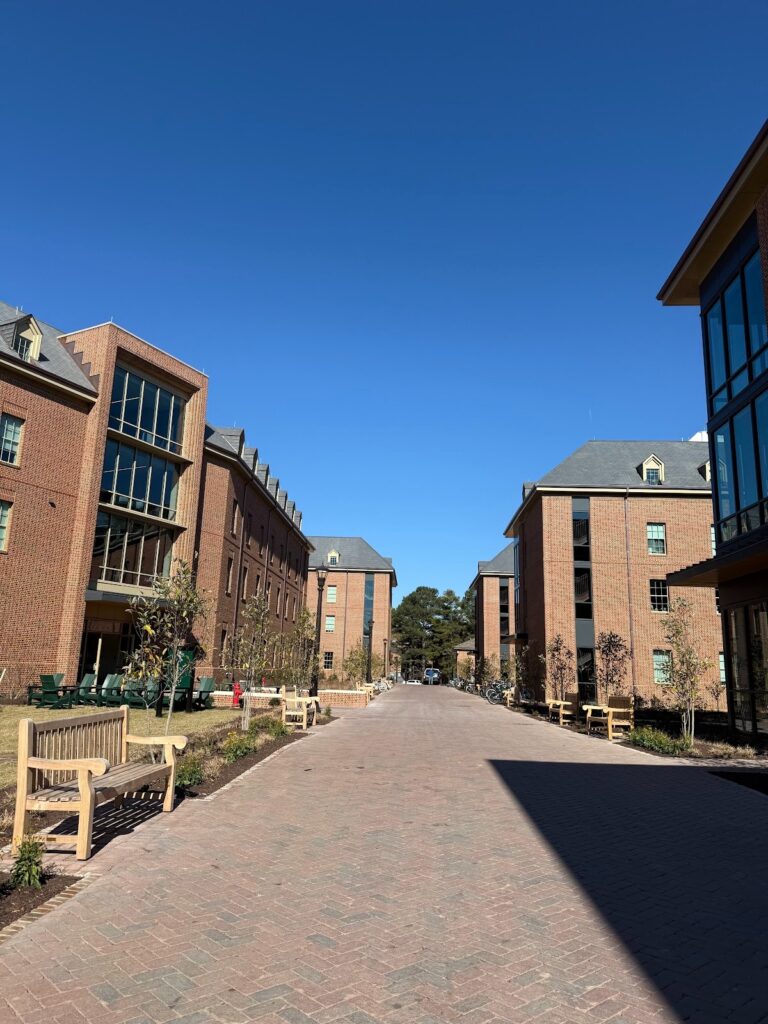
One thing that struck both of us is how much nature is implemented into the designs with tons of outdoor seating, forest-inspired coloring, and lots of natural light. Each hall has its own color, lining the halls and carpeting the study room floors. I cannot wait to see the transformation of campus with all of these new dorms and dining hall!
The Bittersweet Timeline: Knowing College Is Ending but Life’s Just Starting
There’s a strange feeling knowing that we’re past halfway through my final semester in college. It feels somewhere between nostalgia and anticipation. I’m surrounded by everything I once dreamed about: the friends who became family, the campus that became a second home, and the routines that I planned in my head for years. It’s bittersweet to come to terms that this chapter is ending. I’ve worked so hard to get to where I currently am, but it’s already time to say goodbye.
College has been a timeline of milestones: first classes, first jobs, first apartments, spontaneous adventures to Ireland and beyond, and now the timeline stretches forward into the unknown. I think the scariest part of this is how the next milestones aren’t marked on a syllabus or anywhere in my planner. Instead they’re written in real life. A job offer, moving to a new city, new friends. In realizing this, it’s easy to feel like everything is ending. But it’s not truly ending.
Because the truth is, life after college is full of firsts too. There is so much to experience beyond the bubble of class schedules and late nights in the library. I know I’ll miss the familiarity of campus life, but I’m excited to find the freedom in building something new from scratch.
I know this transition won’t always be smooth. There will be moments of uncertainty, loneliness, and longing for what used to be. But there will also be moments of joy, growth, and gratitude when I realize that every version of myself along the way has been preparing myself for this.
With these last few weeks, I understand I’m not losing my college years. Instead, I’m carrying them forward, turning lessons into confidence, memories into motivation, and endings into beginnings.
So here’s to the next chapter. One I get to write entirely on my own.
How to Read Academic Papers Without Losing Focus
This semester, I’m taking a Stress & Immunity class for my advanced biology seminar, and we read a new academic paper for almost every class. At first, I thought it would be pretty straightforward: open the paper, read, take notes. But academic papers have a way of making even the most focused reader drift off halfway through the methods section. With so many different acronyms and scientific jargon, it can be easy to get lost and have to read everything again. After a few weeks, I’ve figured out a system that actually helps me stay focused and understand what I’m reading:
1. Start with the Big Picture
Don’t dive straight into the dense parts. Read the abstract first to get the main question and key findings. Then skip ahead to briefly review the discussion or conclusion to see how it all fits together. Once you know the why and what, the rest of the paper should make a lot more sense when you go back to the details.
2. Have a Purpose Before You Start
Ask yourself what you need from the paper. Are you looking for background info, understanding an experiment, or finding something to cite? Knowing your goal keeps you focused on the relevant sections instead of trying to absorb everything.
3. Highlight Intentionally
I know I’ve been guilty of highlighting entire pages with different colors and then looking back and realized that it just made it harder to determine what’s really important.Try to highlight only what’s essential (ex. the hypothesis, main results, or key terms).
4. Summarize Each Section in a Sentence
Another great tip for making sure you understand everything is summarizing. After finishing each section, pause and summarize it in your own words.
5. Read in Small Chunks
Most academic papers are dense enough that you can lose focus after even a couple pages. Breaking your reading into smaller chunks is a great way to try to maintain energy.
7. End with a Quick Recap
Similar to summarizing by section, writing a short summary of the entire paper can help pull together the intro, methods, and conclusions all in one place.
It’s Feeling Like Fall in the Real-Life Stars Hollow
As a long time Gilmore Girls fan, I’ve always thought Williamsburg had a touch of Stars Hollow magic, especially in the fall. There’s just something about the charm of brick streets, too many coffee shops within walking distance, and just the small town vibes.
Even though the beginning of October came with summer weather, the shift has finally arrived. The mornings are cooler, the air feels crisp, and the sidewalks are slowly gathering piles of amber and red leaves. Campus feels quieter, cozier somehow, like everyone collectively decided to slow down a little.
There’s something so comforting about this time of year. Walking to class in a sweater for the first time, sipping a warm latte (or chai if you’re like me), and crunching the leaves under your feet. It’s the kind of season that makes you want to spend hours at your favorite cafe, catching up with friends or just people watching like Lorelai and Rory.
Fall always brings this mix of nostalgia and new beginnings. Maybe it’s because it reminds us of change: how natural it is and how beautiful it can be. There’s comfort in that rhythm, in the way the world transforms yet somehow still feels familiar. And maybe that’s why even if we’re not technically in Stars Hollow, it sure feels like we are.
What’s in a W&M Student’s School Bag
I always love seeing what’s in my bag posts, so here’s my take on what actually ends up in a W&M student’s school bag! (based on mine and STEP’s followers’ bags!)
- Laptop + charger: Obviously a laptop is a must in college, and mine comes with me everywhere! It’s always a good idea to bring a charger just in-case too.
- Folder: I only use one folder to carry any handouts I get from class or assignments I’m turning in. Since I don’t get that many paper assignments I just use one folder for all of my classes.
- Legal pads: Ever since a legal pad was the only form of notebook I could find in Ireland, I’ve been hooked on using them to take notes in class. I have two: one for scratch and un-pretty notes and another for nice and clean one-pagers! Like the folder, I use one for all my classes and just label the bottom left corner to know which class the notes are from.
- Water Bottle: Hydration is key, especially when it’s over 80 degrees still in October!
- Hand Sanitizer: Virology has made me a bit of a germaphobe, so I carry hand sanitizer with me everywhere.
- Lipbalm: Really can’t go anywhere without lipbalm.
- Headphones: My airpods are also a necessity for listening to music between classes and noise cancelation while studying.
- Snack: Sometimes there’s just not enough time to go grab a formal meal, so I always have a snack or two in my bag! My favorites are honey roasted chickpeas or some sort of protein bar.
- Tissues: I always find my nose running after walking into a freezing ISC lecture hall coming from a humid exterior.
- Bandaid: Just one of those essentials that’s always useful to have on hand!
- Hairties / claw clip: When my hair starts to bother me or it gets a little warmer than expected outside, I have something to put it up!
- Lots & Lots of books: A clear marker of a typical W&M student!
- Planner: W&M students are known to be organized, so having a planner is a must!
